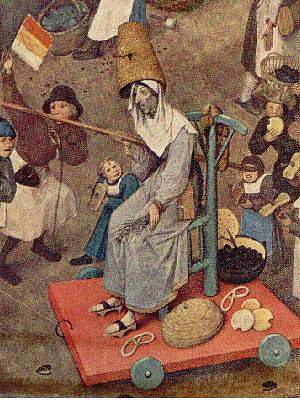 |
| Bruegel: The battle between carnival and Lent |
One of St Benedict's recommendations for Lent is to add something by way of prayer for Lent. Personally, I always think adding in a few extra psalms, and ideally studying them in depth, is a great option.
In past years I've provided a few series to this end, so I thought I'd provide a list of them so you can consider possible options.
The Seven Penitential Psalms
The most traditional psalm offering for Lent are the Seven Penitential Psalms. An index to my notes on them can be found here.
Psalm 118
Another possibility would be to say some or all of Psalm 118 (the longest psalm of the psalter), that great hymn of praise for the law.
There is some tradition behind this too, as a letter attributed to St Benedict's sister, St Scholastica, describes one of her nun's saying it for Lent.
You can find a set of notes, with one part for each day of Lent here.
Holy Week Tenebrae
An alternative might be to say and meditate on the psalms used for the special night Office of Tenebrae during the Sacred Triduum. You can links to my series on these psalms here.
The Gradual Psalms
Another traditional option is to say the fifteen gradual psalms (Psalms 119-133). The Gradual Psalms, or Songs of Ascent, have a traditional association with Easter, as they were originally probably pilgrim songs sung as the people traveled to Jerusalem for major feasts such as the Passover, and also have an association with the solemn ascent of the fifteen steps of the Temple at the entry to the feast.
Although fifteen psalms might sound a lot, in fact they are mostly very short (and include two of the shortest psalms in the psalter). In fact the Gradual Psalms were typically all said before Matins each day in most monasteries from the ninth century onwards, and when this obligation was commuted, it remained obligatory for monks and clerics to say them at a minimum on Wednesdays in Lent for many centuries. In their devotional arrangement, which you can find here, the first five are offered the dead, the second five for the expiation of our sins, and the final five for our particular intentions.
You can find links to more detailed notes on many of them here.
St Benedict's top ten psalms
Finally, you could add to your daily prayers any of the ten psalms that St Benedict thought important enough to have his monk's say every day that you don't fit in to your own daily Office regime. If, for example, you use the Monastic Diurnal, but don't say Matins, you could add in Psalms 3 and 94.
Links to notes on all of these psalms except those for Compline can be found here.
May you have a happy and holy Lent!